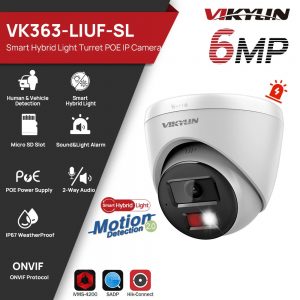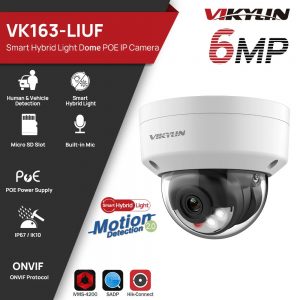When modern surveillance systems require more advanced performance and smart features, Pan-Tilt-Zoom (PTZ) cameras’ combined smart analytics capabilities, such as facial recognition, license plate recognition, and intrusion detection, become critical. These features not only increase the efficiency of the surveillance system, but also enhance its security and diversity of application areas.
The Integration of Security Cameras PTZ and Smart Analysis

Face Recognition
PTZ IP cameras capture faces through high-definition images and use complex algorithms to extract facial features. These features, including the position of the eyes, nose, and mouth, create a unique face template. This technology plays an important role in a variety of scenarios:
Secure Access Control
By comparing face templates with data in known databases, surveillance systems can achieve highly secure access control. Only authorized personnel may enter specific areas.
Employee Attendance
In corporate environments, IP PTZ camera can be used to automatically record employee attendance. This eliminates possible fraud issues with traditional timecard systems.
Real-Time Alerts
If the monitoring system recognizes a specific person, it can immediately trigger an alert to notify security personnel or system administrators so that timely measures can be taken.
License Plate Recognition
License plate recognition technology enables surveillance systems to capture a vehicle’s license plate information and convert it into text data. This is useful for a variety of applications:
Parking Management
In a parking lot or garage, IP PTZ camera can record the entry and exit of vehicles and automatically collect license plate information for billing and management of parking spaces.
Traffic Monitoring
In road monitoring, license plate recognition can be used to track traffic violations, find missing vehicles or assist with traffic management.
Security Checkpoints
At security checkpoints, license plate recognition can be used to verify the legality of entering and exiting vehicles.
Intrusion Detection
Intrusion detection is achieved by setting monitoring areas and motion detection algorithms. network PTZ camera detect motion, compare it to a defined area, and trigger an alarm:
Zone Settings
Administrators can specify areas to monitor, such as building entrances or prohibited areas.
Motion Detection
The camera detects potential intrusions, such as someone crossing a boundary or being in a prohibited area.
Alarm Triggering
Once an intrusion is detected, the monitoring system will trigger a real-time alarm to notify relevant personnel.
Tracking Function
Advanced network ptz camera can automatically track intruders, providing more information and records.
Bringing together Pan-Tilt-Zoom (PTZ) cameras with intelligent analytics stands as a pivotal stride within modern surveillance systems, ushering in a new era of security and adaptability. This technological fusion finds utility across a spectrum of applications, ranging from bolstering access control security to optimizing the efficacy of traffic management. Nevertheless, as the utilization of these smart features becomes increasingly widespread, it is imperative that we address privacy and data protection concerns earnestly to align with pertinent regulations and laws. The future landscape of surveillance systems will undoubtedly witness a continual evolution, ushering in even more sophisticated technologies to meet the evolving needs and complexities of our world.





